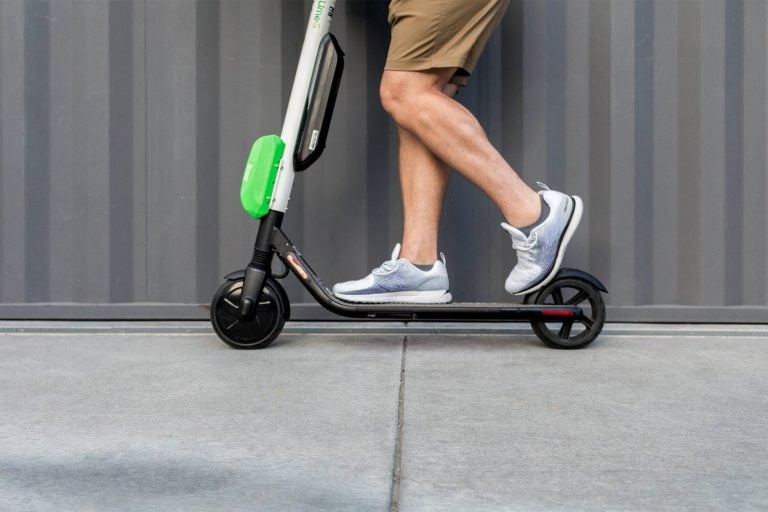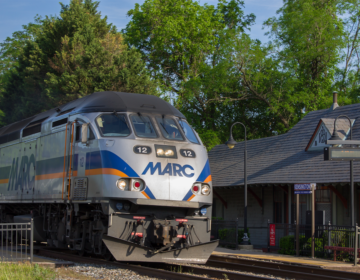Slow your roll: Safety worries could delay electric scooters’ ride into Philly
Consumer Reports reported earlier this month that about 1,500 people have been injured in e-scooter crashes in the U.S. since 2017.

Lime is applying for permits to bring its e-scooters to Philadelphia's streets. (Courtesy of Lime)
This story originally appeared on PlanPhilly.
—
Philadelphia loves the idea of scooting around on the colorful electrically powered two-wheelers that startups like Lime are sending out on city streets around the world.
But at a city hearing on Wednesday, local officials said e-scooter enthusiasts may want to slow their roll.
Four people have died in scooter crashes in the U.S. over the past year, compared to just two using bike share programs since they started nine years ago, said Chris Puchalsky, director of policy and strategic initiatives at the Mayor’s Office of Transportation, Infrastructure and Sustainability (OTIS).
Consumer Reports reported earlier this month that about 1,500 people have been injured in e-scooter crashes in the U.S. since 2017. The “relatively high risk of crashes” points to a need for more study before the trim rides are made street legal in the city, he said.
“It is our recommendation that the City of Philadelphia refrain from promoting or permitting the use of dockless scooter programs until a more thorough analysis of the benefits and risk to public safety are better understood,” he said. “It would be more appropriate to revisit these issues in one year’s time.”
The cautionary tone stood in contrast to the optimistic projections of industry representatives, transportation advocates and some City Council members who say they want to see dockless electric scooters on the city’s streets by summer.
“This is a type of transportation that we should be moving forward with … especially based on the fact that it will reduce people’s use of cars as a mode of transportation,” Councilman Derek Green said at a council hearing Wednesday.
Representatives of Lime, Bird, and Spin, private companies that together rent scooters in more than 80 cities, descended on City Council chambers with their devices and plenty of talking points. They want the city to create rules governing scooter fleets and support proposed state legislation that would legalize them, and are lobbying in the city to get those results, city disclosures show.
The scooter companies tried on Wednesday to paint scooters as urgently needed to address Philadelphia’s transit equity and traffic-safety problems.
Shari Shapiro, government relations official for Lime, said her company would put scooters in neighborhoods not served by public transit or Indego, the city’s bike share program, which requires users to go to fixed stations to check out bikes. She said Lime’s ridership includes proportionally more women and people of color than traditional bike share.
The companies noted a finding from Portland that 34 percent of local users took e-scooters as an alternative to a car, taxi, or ride-hail, reducing congestion and the dangers posed by traffic.
“I was a tech entrepreneur here for many years. What I found is that Philadelphia is behind its peers in almost every measure,” Shapiro said. “We need to inspire other cities. We need to show them how to do this well and safely, how we can get the best out of dockless electric scooters.”
The arrival of e-scooters has been eagerly anticipated by many residents, as evidenced by a flurry of excitement last fall when it momentarily (and falsely) appeared that Lime was starting operations in the city.
Council members Kenyatta Johnson and Mark Squilla also said they want to see the city set up a scooter program in the near future.
Puchalsky said the city wants to work out rules for dockless bike-share companies and learn from the rollout of those programs before moving on to scooters. OTIS will put out proposed dockless bike regulations in the next month or two, he said.
Dr. Cheryl Bettigole, director of the city’s Department of Public Health’s Division of Disease and Injury Prevention, echoed his safety concerns.
She said the Portland study found a much higher rate of injuries per mile traveled for e-scooters than for motorcycles and bike-share.
The scooter companies disputed the safety concerns. Paul White, a Bird representative, said e-scooters are no more dangerous than bicycles. Portland officials concluded from the study of its programs that the scooters “do not pose a disproportionate risk,” White said.
Shapiro said Lime had redesigned its bikes with added safety measures, making them heavier, with a lower center of gravity, wider footboards, larger tires and a screen to remind users to wear helmets.
The council also heard from the nonprofit Clean Air Council, the Bicycle Coalition of Greater Philadelphia, a University of Pennsylvania transportation professor, and Bikemore, an advocacy group in Baltimore, which launched an e-scooter pilot six months ago.
These transportation advocacy groups endorsed allowing e-scooters in Philadelphia. The scooters offer a fun, convenient and low cost car-alternative for people who aren’t excited about biking, making them a good way to improve mobility for a wide range of residents, they argued.
Megan Ryerson, a professor and founder of the Center for Safe Mobility at Penn, said cities with scooters have experienced reductions in driving and demand for ride-hailing operations like Uber. Adding scooters to the road increases drivers’ awareness of all non-car entities on the road, boosts support for bike lanes, and increases safety overall, she said.
At the same time, speakers said the city must take steps to ensure a smooth ride for the trim devices. For example, companies should be required to share data on scooter use to ensure equity goals are being met. The scooter companies also must be held accountable for broken or abandoned scooters to ensure they don’t block sidewalks or cause blight, they said.
Nick Zuwiala-Rogers of the Clean Air Council said the companies should be required to dispose of their used batteries and scooters in a sustainable manner and should hire full-time local staff to recharge and repair vehicles rather than depending on gig workers.
Some speakers saw the scooter industry as an opportunity to generate income that would go back into city streets.
The small per-ride fee the city would earn if scooters were legalized should go to the Streets Department to patch potholes and improve roads, these speakers suggested. Without fixes, scooters could make Philadelphia even more dangerous, they said.
Oren Eisenberg, a Fishtown resident and bike advocate, rode e-scooters in California. That experience makes him afraid for scooter riders navigating the bumps and ditches of local streets, he said.
Council passed a bill to regulate dockless bikes and scooters last June and state legislation legalizing the scooters was introduced this week.
WHYY is your source for fact-based, in-depth journalism and information. As a nonprofit organization, we rely on financial support from readers like you. Please give today.







